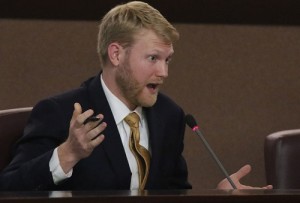![[John P. Flannery was a federal drug prosecutor in the Southern District of NY, and served on various drug task forces since.]](http://www.loudounprogress.org/wp-content/uploads/2017/03/Heroin_needle-300x168.jpg)
[John P. Flannery was a federal drug prosecutor in the Southern District of NY,
and served on various drug task forces since.]
We say we want to fight drug addiction in this nation and in the communities where we live but we are not helping the addicts.
There is a frenzy among elected and appointed officials, blathering on at press conferences, oh so concerned, seeking to discourage drug use and addiction, including street heroin and prescription drugs.
But law enforcement is not going after the drug kingpins, instead it’s chasing and arresting the low hanging fruit that are the persons, the addicts, they say they want to help.
Our law enforcement officials are going after the drug stats that bring funds into sheriff’s offices and police stations around the nation, and they get these numbers by arresting those who may rightly be considered the victims of the drug trade, the addicts that these chest-beating officials insist they want to help.
If you go after drug lords, they fight back. An officer can get hurt doing that. I’ve known brave men and women from the DEA, however, who did just that, went undercover, risked life and limb, and broke up drug rings that saved many from addiction.
On the other hand, if you go after the victims of the drug trade to make a criminal case, you’ve got an easy mark, with little or no personal risk as an officer.
In the 70s when we called this a “war” on drugs, and believed we’d some day win “the war,” I prosecuted drug lords who brought 600 pounds of heroin from France, and mobsters who brought many millions of dollars of heroin from Thailand. Other members of our “junk” unit worked similar cases. While the drug trade persists these many years later, we seem to have gotten worse at fighting – what one DEA agent called – the white death.
Too often these days, our enforcement policies are awfully close to criminalizing an individual’s status as addict, a health problem. We prosecute an addict as a criminal, whom we insist to the papers and the general public, this is a person who can’t help himself, and this is a person who commits other petty offenses including small quantity hand to hand drug buys to afford his fix.
The Supreme Court, in Robinson v. California, 370 US 660, 666, 82 S. Ct. 1417, 1420, 8th Ed 2d 758 (1962), found it to be a “cruel and unusual punishment”, a violation of the 8th Amendment, to make it a crime to be an addict:
“A State may not punish a person for being ‘mentally ill, or a leper or . . . . afflicted with a venereal disease’, or for being addicted to narcotics.” Id.
The Court said “To inflict punishment for having a disease is to treat the individual as a diseased thing rather than as a sick human being.”
In Robinson, the crime of addiction was a misdemeanor, and so the punishment was not as severe as what we do to some addicts these days when we “save them” only to “prosecute them” for felonies.
The Robinson Court said the fact “[t]hat the punishment is not severe, ‘in the abstract,’ is irrelevant”. It is the disproportion between the conduct and the penalty. “Even one day in prison,” the Court said, “would be cruel and unusual punishment for the ‘crime’ of having a common cold.” Id., at 667, 82 S. Ct. at 142.
I know well a young man in the area, who was an addict, suffered an overdose, passed out, would have died, and been lost to friend and family alike had he not been brought back to consciousness by the drug, Narcan.
This young man was taken to the hospital where he was observed by the attending physician and nurses to assure that he would survive.
(Even after receiving the drug Narcan, there is no guarantee that the patient will survive.)
But lo and behold, a law enforcement officer stationed himself in the young man’s emergency room after he was admitted.
Another officer entered the emergency room and remained continuously with the young man, sitting bedside, asking him questions within an hour of the young man’s overdose, within minutes of the young man’s partially remembered glimpse into the mid-distance between life and death.
The officer told the young man, he didn’t want to prosecute the young man – as if the young man could possibly understand what the officer meant.
The officer asked him “to cooperate,” tell what he knew, and he wouldn’t be prosecuted.
It would be fair to say the young man didn’t have his mind about him. The young man told the officer what he knew of the small quantities he used and where he got them and who he traded small amounts with in order to sustain his addiction.
At the end of this, the law enforcement officer found his “cooperation” unsatisfactory and sought to prosecute him for the felony of trafficking in drugs.
There you have it, what we really mean by helping addicts.
We don’t.










![[John P. Flannery was a federal drug prosecutor in the Southern District of NY, and served on various drug task forces since.]](http://www.loudounprogress.org/wp-content/uploads/2017/03/Heroin_needle-300x168.jpg)
